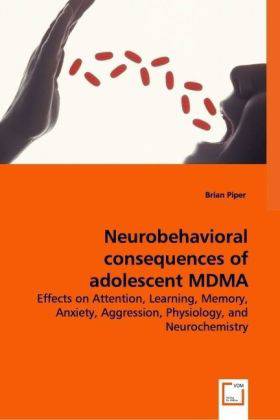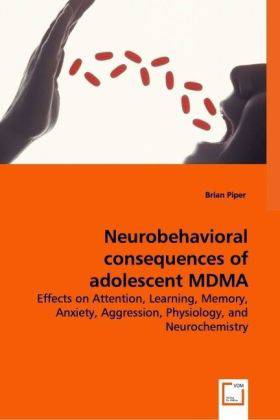
Bedankt voor het vertrouwen het afgelopen jaar! Om jou te bedanken bieden we GRATIS verzending (in België) aan op alles gedurende de hele maand januari.
- Afhalen na 1 uur in een winkel met voorraad
- Gratis thuislevering in België vanaf € 30
- Ruim aanbod met 7 miljoen producten
Bedankt voor het vertrouwen het afgelopen jaar! Om jou te bedanken bieden we GRATIS verzending (in België) aan op alles gedurende de hele maand januari.
- Afhalen na 1 uur in een winkel met voorraad
- Gratis thuislevering in België vanaf € 30
- Ruim aanbod met 7 miljoen producten
Zoeken
Neurobehavioral consequences of adolescent MDMA exposure in rats - Effects on Attention, Learning, Memory, Anxiety, Aggression, Physiology, and Neurochemistry
Effects on Attention, Learning, Memory, Anxiety, Aggression, Physiology, and Neurochemistry
Brian Piper
Paperback | Engels
€ 86,45
+ 172 punten
Omschrijving
The drug ±3,4-methylenedioxymethamphetamine (MDMA or ecstasy) is a popular recreational substance among young people. Most prior research has not attempted to carefully emulate human ecstasy use patterns in animal investigations. The objectives of the present series of experiments were to develop a rat model of intermittent ecstasy use and to begin to characterize the acute and long-term physiological, behavioral, and neurochemical consequences of adolescent MDMA exposure. These studies determined that: 1) repeated exposure to a clinically relevant MDMA dose can reduce cognitive function and alter affective behavior, 2) adolescent MDMA can lead to MDMA tolerance in adulthood, 3) the behavioral toxicology of MDMA may not be exclusively mediated by decreases in the serotonin transporter. Overall, these findings indicate that the enduring neurobiological consequences of MDMA may not be limited to the serotonergic system and have substantial public health implications for regular ecstasy users.
Specificaties
Betrokkenen
- Auteur(s):
- Uitgeverij:
Inhoud
- Aantal bladzijden:
- 140
- Taal:
- Engels
Eigenschappen
- Productcode (EAN):
- 9783639003567
- Verschijningsdatum:
- 16/06/2008
- Uitvoering:
- Paperback
- Formaat:
- Trade paperback (VS)
- Afmetingen:
- 152 mm x 229 mm
- Gewicht:
- 195 g

Alleen bij Standaard Boekhandel
+ 172 punten op je klantenkaart van Standaard Boekhandel
Beoordelingen
We publiceren alleen reviews die voldoen aan de voorwaarden voor reviews. Bekijk onze voorwaarden voor reviews.









